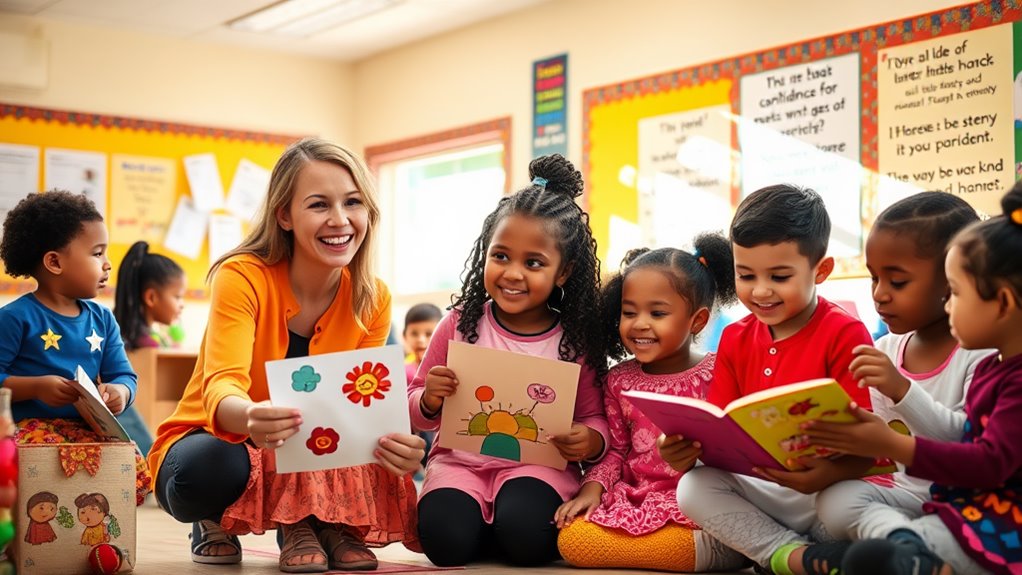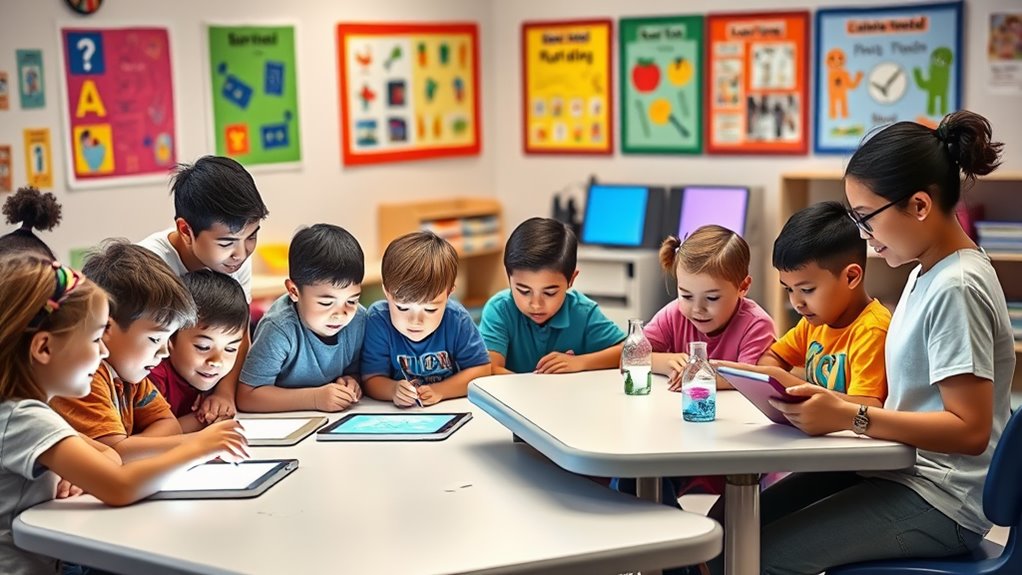Are Schools Failing at Parenting and Education Collaboration
Yes, many schools are failing at essential collaboration with parents, which negatively impacts student achievement. Research shows students thrive in environments where parental involvement is prioritized. Yet, barriers, such as communication gaps and scheduling conflicts, prevent effective partnerships. Teachers face curriculum demands that limit engagement with families. Meanwhile, parents often feel disconnected and overwhelmed. Improving collaboration requires structured channels of communication and mutual respect between educators and families. Emphasizing shared goals can foster a supportive community, leading to better educational outcomes. You’ll discover strategies and tools that can significantly improve this critical relationship.
Key Takeaways
- Many parents feel disconnected from schools due to inadequate communication, undermining collaboration essential for student success.
- Teachers face curriculum demands that limit their time for meaningful interactions with parents, hindering effective partnerships.
- Trust issues and cultural differences create barriers that complicate communication between families and educators.
- Scheduling conflicts and language barriers further isolate parents, preventing their active participation in school activities.
- Without structured communication channels and tailored engagement strategies, schools struggle to foster strong collaboration with parents.
The Current State of Collaboration
In many communities, collaboration between schools and parents has become increasingly essential for fostering student success. However, the current state of this collaboration faces several challenges. Many parents feel disconnected from their children’s educational experiences, often due to a lack of communication and engagement from schools. Teachers, overwhelmed by curriculum demands, may struggle to find time for meaningful interactions with parents, which can undermine collaborative efforts.
To address these current challenges, schools must adopt effective collaborative strategies. First, implementing regular, structured communication channels—such as newsletters, parent-teacher conferences, and digital platforms—can bridge the gap between home and school. Furthermore, schools should offer workshops that educate parents about curricular expectations and provide resources for supporting their children’s learning at home.
Additionally, fostering a culture of inclusivity is crucial. Schools should actively seek diverse parental input and create opportunities for involvement that accommodate various schedules and needs. By prioritizing these collaborative strategies, schools can not only enhance parental engagement but also create a more supportive environment for students, ultimately leading to improved academic outcomes and a stronger school community.
Impact of Parental Involvement
Parental involvement significantly influences student achievement and overall well-being. When you engage in your child’s education, you directly affect their academic performance and educational outcomes. Your expectations shape their aspirations and encourage a growth mindset, leading to improved results. Effective involvement strategies can boost not just grades but also self-esteem and motivation.
Consider these critical aspects of parental involvement:
- Parental Expectations: High expectations often correlate with increased student effort and persistence.
- Family Dynamics: Supportive family environments foster resilience and adaptability in children.
- School Resources: Active participation helps you advocate for adequate resources and programs within schools.
- Support Systems: Strong home-school partnerships create networks that bolster academic and emotional support.
- Communication Practices: Open dialogue between you and educators promotes transparency and collaborative problem-solving.
Barriers to Effective Communication
Effective communication between schools and parents can be hindered by various barriers that often go unnoticed. One significant issue is trust issues, which can create an emotional disconnect between families and educators. Cultural differences further complicate interactions, as varying backgrounds influence expectations and communication styles.
Scheduling conflicts can also pose challenges; parents may struggle to attend meetings, leading to missed opportunities for collaboration. Language barriers exacerbate these problems, leaving non-native speakers feeling isolated and uninformed. Additionally, technology gaps can limit access to essential information, particularly for families without reliable internet or devices.
Information overload frequently overwhelms parents, who may receive excessive updates without clear guidance on prioritization. This can result in engagement fatigue, where individuals feel too inundated to respond or participate meaningfully. Lastly, resource limitations often prevent schools from implementing effective outreach programs, reducing the potential for meaningful connections.
Addressing these communication barriers requires a concerted effort to foster understanding, create inclusive environments, and prioritize clear, consistent messaging. Only then can schools and parents form the collaborative partnerships necessary for student success.
Case Studies of Successful Partnerships
In examining successful partnerships between schools and parents, you’ll find that community engagement initiatives play a crucial role in fostering collaboration. Parent-teacher models that emphasize mutual support can lead to significant improvements in student outcomes. By analyzing these case studies, you can identify key strategies that contribute to effective partnerships.
Community Engagement Initiatives
Across various communities, successful partnerships between schools and parents have emerged as vital components of educational engagement. These collaborations not only enhance student learning but also foster a sense of belonging. By actively involving parents and community members, schools create an environment where everyone shares responsibility for educational outcomes.
Consider these effective community engagement initiatives:
- Organized community events that celebrate student achievements, encouraging parental involvement.
- Volunteer opportunities that allow parents to participate in classroom activities, enhancing their connection with educators and students.
- Workshops and seminars focused on educational resources, equipping parents with tools to support their children’s learning.
- Mentorship programs pairing community members with students, providing additional support and guidance.
- Feedback forums that invite parents to voice concerns and suggestions, fostering a culture of cooperation and transparency.
These initiatives not only strengthen the fabric of the school community but also empower parents to take an active role in their children’s education. Ultimately, fostering a collaborative environment ensures that both schools and families are aligned in their mission to support student success.
Parent-Teacher Collaboration Models
Collaboration between parents and teachers can significantly enhance student outcomes, creating a robust support system that addresses diverse educational needs. Effective collaboration frameworks establish clear expectations and communication channels, fostering a sense of shared responsibility for student success. One successful partnership model is the Teacher-Parent Advisory Group, which includes regular meetings to discuss academic progress and strategize on interventions. This model empowers parents, making them active participants in their child’s education.
Another exemplary model is the Family Engagement Program, where teachers conduct workshops that equip parents with strategies to support their children’s learning at home. This initiative not only strengthens the home-school connection but also builds trust and mutual respect among families and educators.
Additionally, schools that implement digital platforms for communication—such as apps and portals—facilitate real-time updates on student performance, making it easier for parents to engage constructively. By analyzing these case studies, it’s clear that systematic collaboration fosters a culture of partnership that enhances educational experiences. Ultimately, leveraging these partnership models can lead to sustainable improvements in student achievement, benefiting the entire school community.
Successful Program Outcomes
Successful partnerships between schools and parents often yield impressive program outcomes that showcase the benefits of a unified approach to education. When schools and families collaborate effectively, they create an environment conducive to student success. Successful mentorship programs and collaborative projects stand out as prime examples of this synergy.
Consider the following outcomes of such partnerships:
- Increased student engagement and motivation, leading to higher academic performance.
- Enhanced communication channels between parents and educators, fostering a supportive community.
- Development of tailored mentorship initiatives that address diverse student needs.
- Greater involvement in school activities, resulting in a more vibrant school culture.
- Improved social-emotional well-being for students, driven by supportive networks.
These outcomes highlight how effective collaboration can bridge gaps between home and school, reinforcing the notion that education is a shared responsibility. By actively engaging in collaborative projects, parents and schools not only enhance educational experiences but also cultivate lifelong learners. Your involvement in these partnerships can transform the educational landscape, ensuring that every student thrives in an environment that values both academic excellence and holistic development.
Strategies for Improvement
Effective strategies for improvement in the collaboration between schools and parents can significantly enhance student outcomes. To foster this collaboration, schools should implement parent workshops that focus on developing communication skills and involvement strategies. These workshops not only impart essential knowledge but also create opportunities for parents to engage actively in their child’s education.
Establishing feedback loops is crucial; schools must encourage parents to share their insights and concerns regularly. This reciprocal communication helps build mutual respect, ensuring that both parties feel valued in the process. Additionally, aligning on shared goals can create a unified vision for student success, making it easier for schools and parents to work together effectively.
Resource sharing is another vital strategy. Schools can offer parents access to educational materials and support services, equipping them to better assist their children. Similarly, parents can share their expertise and resources, enriching the school’s offerings. Ultimately, relationship building should be at the forefront of these strategies, as strong connections between parents and educators foster a collaborative environment that promotes holistic student development. By prioritizing these approaches, both schools and parents can significantly improve their partnership in education.
Role of Technology in Collaboration
In today’s education landscape, technology plays a crucial role in enhancing collaboration between schools and parents. Digital communication tools streamline interactions, while online learning platforms provide resources that engage parents in their children’s education. Virtual parent engagement initiatives further strengthen this partnership, fostering a supportive community for student success.
Digital Communication Tools
Harnessing digital communication tools has transformed the way schools and parents collaborate, making interactions more efficient and accessible. You now have various digital platforms at your disposal that streamline communication and foster engagement. These tools not only create opportunities for dialogue but also enhance the transparency of educational processes.
Consider the following benefits of utilizing digital communication tools:
- Real-time updates: Parents can receive immediate notifications about their child’s progress or concerns, enabling timely interventions.
- Centralized information: Digital platforms consolidate resources, schedules, and announcements, reducing the chance of miscommunication.
- Diverse communication methods: From emails to messaging apps, you can choose the format that suits you best, ensuring that your voice is heard.
- Accessibility: With mobile apps and web-based interfaces, parents can engage with school communications anytime, anywhere, promoting a culture of involvement.
- Data-driven insights: Advanced analytics from these tools can help educators and parents identify trends in student performance and address issues proactively.
Online Learning Platforms
Digital communication tools have paved the way for the integration of online learning platforms, further enhancing collaboration between schools and parents. These platforms allow for seamless interaction, enabling you as a parent to engage more deeply with your child’s educational journey. With online learning, information is readily accessible, and you can monitor your child’s progress in real time.
Moreover, online learning platforms often feature built-in mechanisms for parental feedback. This feedback loop is essential, as it not only keeps you informed but also empowers you to contribute constructively to the educational process. When schools leverage these platforms effectively, they create an environment where your insights can influence teaching methods and curricular adjustments.
Additionally, the data collected through online learning systems can help educators tailor their approaches based on the unique needs of each student, ensuring that your child’s learning experience is optimized. As you engage with these technologies, it’s vital to recognize their role in bridging the gap between home and school. In doing so, you can foster a collaborative environment that benefits not just your child, but the broader educational community.
Virtual Parent Engagement
Technology has transformed the landscape of parent engagement, making it easier than ever for you to connect with teachers and school administrators. Virtual parent engagement leverages various digital tools to facilitate collaboration, ensuring that you remain informed and involved in your child’s education. This shift not only enhances communication but also fosters a sense of community among parents and educators.
Consider the following aspects of virtual engagement:
- Virtual Workshops: These events allow you to gain insights into educational strategies and student needs, providing actionable information to support your child at home.
- Online Forums: These platforms create space for discussion, enabling you to share experiences and solutions with other parents, thus building a supportive network.
- Real-Time Feedback: Technologies like messaging apps allow for immediate communication regarding your child’s progress or challenges.
- Resource Sharing: Digital tools can facilitate the distribution of educational materials, ensuring you have access to necessary resources.
- Flexible Scheduling: Virtual meetings often accommodate your busy schedule, allowing for more frequent and meaningful interactions.
Future of School-Parent Relationships
As educational landscapes evolve, a significant shift is emerging in the dynamics of school-parent relationships. Future trends indicate that these relationships will increasingly hinge on collaborative strategies that prioritize active engagement practices. Schools and parents must navigate evolving roles, fostering an environment where each party contributes to student success.
Trust building will be essential in this new paradigm. Effective communication styles, tailored to meet diverse cultural considerations, will enhance understanding and cooperation. Schools can implement feedback mechanisms that allow parents to voice their insights and concerns, creating a more inclusive atmosphere.
Support networks will play a crucial role, bridging gaps between families and educators. These networks can facilitate resource sharing, mentorship opportunities, and community involvement, ultimately enriching the educational experience for students.
Moreover, as technology advances, schools will leverage digital platforms to strengthen engagement, ensuring parents remain informed and involved. By embracing these changes, schools can cultivate robust partnerships with families, enhancing student outcomes and fostering a sense of community. The future of school-parent relationships lies in mutual respect, collaboration, and a commitment to shared goals, ultimately setting the stage for continuous improvement in education.
Frequently Asked Questions
How Can Parents Address Concerns With School Administration Effectively?
To address concerns with school administration effectively, you should employ clear communication strategies and focus on conflict resolution. Prepare your points, listen actively, and seek collaborative solutions to foster a productive dialogue and strengthen relationships.
What Role Do Teachers Play in Fostering Parent-School Relationships?
Teachers play a vital role in fostering parent-school relationships through effective communication. For instance, when you reach out regularly, sharing student progress, it builds trust and encourages collaboration, ultimately enhancing the educational experience for everyone involved.
How Can Schools Measure the Success of Their Collaboration With Parents?
To measure success in collaboration with parents, you should analyze parent feedback and establish collaboration metrics like participation rates, communication frequency, and satisfaction surveys. This data helps assess the effectiveness of your engagement strategies and interventions.
Are There Specific Training Programs for Parents to Enhance Collaboration?
Yes, many schools offer parent workshops designed to enhance family engagement. These programs provide parents with strategies to support their children’s education, fostering collaboration between home and school, ultimately benefiting student success and well-being.
What Legal Rights Do Parents Have Regarding Their Child’s Education?
You have essential parental rights under education laws, ensuring access to your child’s records, participating in decision-making, and advocating for appropriate services. Understanding these rights empowers you to navigate and influence your child’s educational experience effectively.




